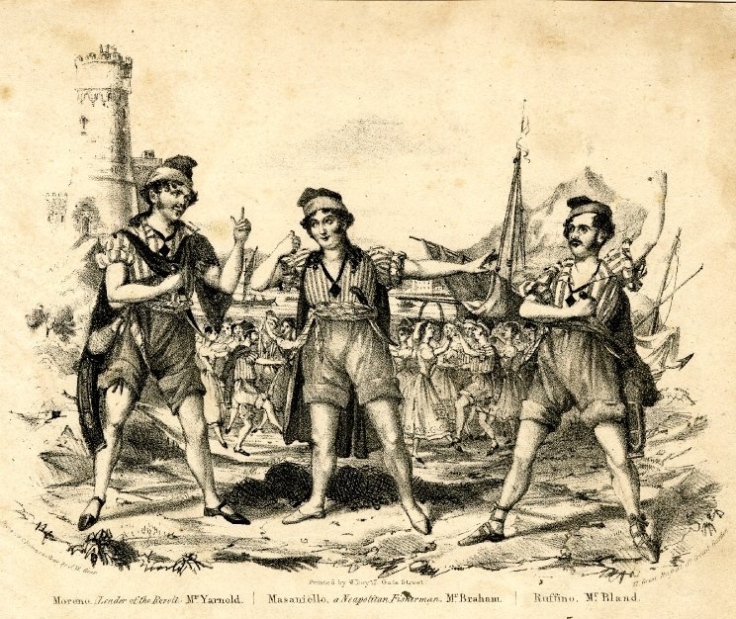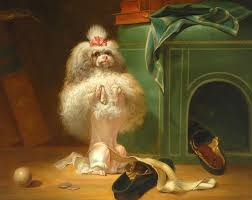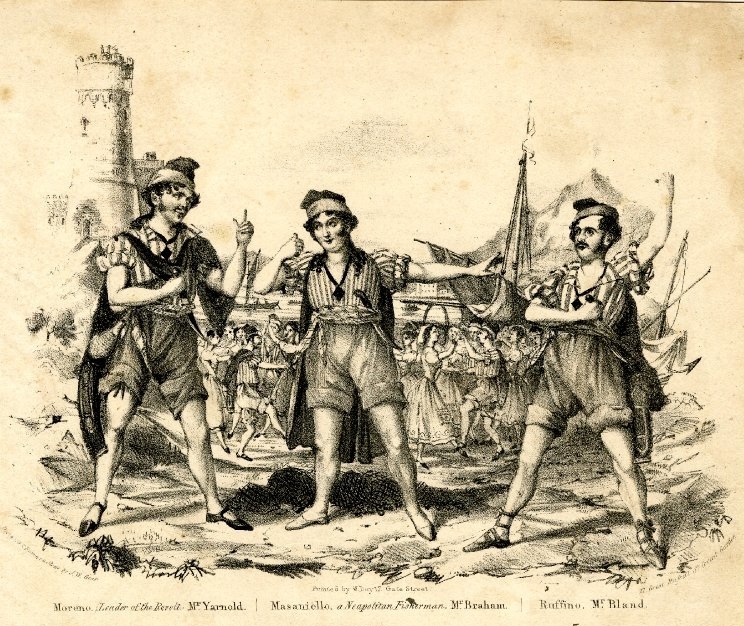One of the effects of following Dickens’ Italian tour in real-time is that it makes the pacing of his tour that much more noticeable; in particular how much things have slowed down since arriving in Genoa in late July. After the hustle and bustle of the journey down, with what seemed like a new destination every day, Dickens’ adventure abroad has taken a much calmer tone. His letters to Forster have fallen into a more regular weekly pattern, with occasional dispatches to other correspondents, and Dickens himself has been focusing his attention purely on Genoa, with no excursions outside of the city. The change in pace is keenly felt by Dickens:
I seem to be thinking, but I don’t know what about – I haven’t the least idea. I can sit down in a church, or stand at the end of a narrow Vico, zig-zagging uphill like a dirty snake: and not feel the least desire for any further entertainment. Just in the same way, I lie down on the rocks in the evening, staring the blue water out of countenance; or stroll up the narrow lanes, and watch the lizards running up and down the walls…I never knew what it was to be lazy before…I feel that I am getting rusty.
For a man who constantly kept himself busy, either working or walking, suddenly he is adopting to an entirely different pace of life. The only work on the horizon is The Chimes, which he does not intend to begin until October (although he already has his ‘paper…arranged, and [his] pens…spread out, in the usual form’ as he wants them for when the time comes). With all distractions and responsibilities at a minimum, Dickens has time to focus on his surroundings, himself, and his family. Let’s take a look back at his first few weeks in Italy.
The City
Dickens does not take an immediate liking to Genoa. Even in 1846, when he recounts the experience for Pictures from Italy, he makes no attempt to conceal his early concerns.
The first impressions of such a place as Albaro, the suburb of Genoa where I am now, as my American friends would say, ‘located,’ can hardly fail, I should imagine, to be mournful and disappointing. It requires a little time and use to overcome the feeling of depression consequent, at first, on so much ruin and neglect…I stroll about here, in all the holes and corners of the neighbourhood, in a perpetual state of forlorn surprise
Ouch. According to Pictures it took ‘the course of two months’ before ‘the flitting shapes and shadows of my dismal entering reverie gradually resolved themselves into familiar forms and substances’, so don’t expect any wild praise in September either.
He does find time to praise the view though, quite consistently. ‘The views from the hills here, and the immense variety of the prospects of the sea, are as striking, I think, as scenery can be.’
Dickens himself rather fulfils the stereotype of an Englishman in his constant fascination with the weather. He complains when it is too hot; he complains when it rains. On the 12th August he regrets, being ‘in the height of the heat’ that ‘walking is wholly out of the question. I feel that deprivation very much.’ But just over a week earlier he had bemoaned the rain forcing him to ‘postpone going round the hills which encircle the city, or seeing any of the sights, until the weather is more favourable.’
One of Dickens’ outlets at this time is swimming. He writes to Clarkson Stanfield of his newfound passion:
What do you think of my suddenly finding myself a Swimmer? But I have really made the discovery; and skim about a little blue bay just below the house here, like a fish in high spirits.
Dickens is not above self-ridicule here, taking time also to describe the comical figure he cuts in his bathing costume he has to wear. ‘Everybody wears a dress’ he tells Forster, ‘mine extremely theatrical’; it makes him look like ‘Yarnold in Massaniello’ he tells Stanfield, prompting him to sing ‘a barcarole on the rocks’. Yet for all the ridiculousness of his own appearance, he notes nonetheless the serenity of the coast and the sea breeze which is ‘refreshing and cool’; not to mention the ‘very peaceful view’, and the ‘very good bathing’…despite the death of a friar in the water one day.

One aspect that fascinates Dickens in Genoa itself is the puppet theatre, and it is unsurprising to see so much of the chapter on Genoa in Pictures devoted to the topic of ‘the drollest exhibition I ever beheld in my life.’ But before we imagine Dickens enamoured with Italian life, it should be noted that his fascination is in how ‘exquisitely ridiculous’ it all is; with ‘no plot at all’ and dubious portrayals of the English that prompt Dickens to gleefully call it all ‘unspeakably ludicrous.’
The accommodation

Dickens’ first residency in Genoa is the Villa Bagnerello (“it sounds romantic, but Signor Banerello is a butcher hard by”), which he nicknamed the Pink Jail. The letting of this place was the responsibility of Dickens’ friend Charles Fletcher, who Dickens had sent ahead to secure the place and have it ready for when he and his family arrived. It was not easy to get to, the ‘lanes so very narrow’ that it was necessary to measure the carriage before driving it down. Dickens’ impression of the house is informed by his impression of the town, echoing the same sleepy lifestyle:
When you have got through these narrow lanes, you come to an archway, imperfectly stopped up by a rusty old gate – my gate. The rusty old gate has a bell to correspond, which you ring as long as you like, and which nobody answers, as it has no connection whatever with the house. But there is a rusty old knocker, too – very loose, so that it slides when you touch it – and if you learn the trick of it, and knock long enough, somebody comes.
Once inside you enter ‘a most enormous room with a vaulted roof and whitewashed walls…this is the sala’ in which ‘all the chairs are immoveable, and the sofa weighs several tons.’ The house has two kitchens and several bedrooms and is ‘a mighty old, wandering, ghostly, echoing, grim, bare house’. Unsurprisingly, Dickens’ description of the house swiftly turns to the weather, noting that the blinds must be closed at night to keep out mosquitos, and closed in day to keep out the heat. The closed blinds, and openness of the sala, allow Dickens some respite from the Italian heat, but Dickens has also recognised during his first month, that the Villa’s openness, welcome enough for Summer, means that it ‘would never do for a Winter residence’, and has now made arrangements to move, in October, to La Peschiere, which he will retain for the remainder of his time in Italy (and in which he seems much happier!).
The family
Dickens is not alone of course, and in his personal letters we get updates on the family that are omitted from Pictures from Italy. Kate has not been well. At the end of July Dickens wrote of a ‘swelling in her neck’ which ‘hardly seems to have subsided or softened’. Thankfully by sheer luck, a renowned doctor, Sir James Murray, was in Genoa at the time and sent for to see her. Two weeks later in mid-August, Dickens reports that Kate ‘is recovering now, thank Heaven, and goes out every night upon a donkey.’ The mind boggles. Towards the end of the month Dickens too takes a turn for the worst, suffering ‘unspeakable and agonizing pain in the side’, so that he ‘was not quite sure that I should get so far round the corner as to be myself again, by tomorrow’. Forster notes it only takes a few days for Dickens to recover.
The family are making social connections, including the merchant T C Curry, who Dickens initially applies to for assistance after – gasp – his pens, paper and books are seized by customs; and by the end of the month he is invited to dinner with Dickens and Catherine (who checks the cupboard to find they have *just* enough plates for guests). The servants too are settling in; Dickens notes their initial reticence to learn the Italian language, but by the end of the month this seems to change.

Finally, of course, is Timber the dog. Poor Timber. Heat, and fleas, have not been kind to the family pet. Shaved to look like a lion dog, he scratches himself constantly, concerns Dickens terribly (‘he looks like the ghost of a drowned dog..It is very awful to see him slide into a room…I think he’ll die of grief’); even on the mend still does not have full control of his limbs thanks to a few lingering ticks: ‘The fleas only keep three of his legs off the ground now, and he sometimes moves of his own accord towards some place where they don’t want to go’. Poor Timber seems to have even more reservations about the climate in Genoa than Dickens – what’s that saying again about mad dogs and Englishmen…?


Leave a comment